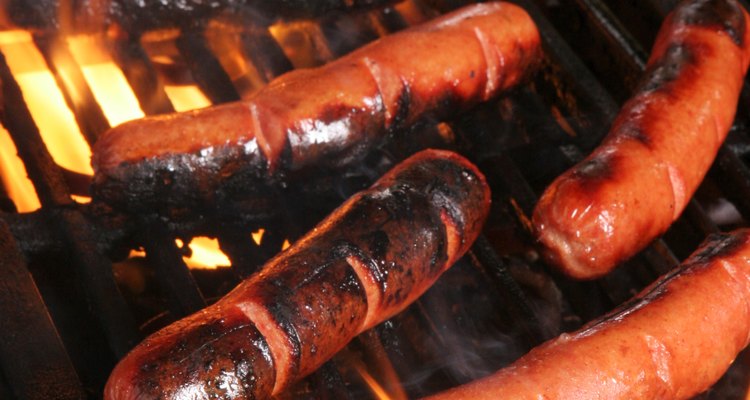
Jack Puccio/iStock/Getty Images
In the simplest terms, food preparation is a series of chemical reactions that change the quality of foods to make them edible. Heat increases the activity of chemicals within foods to speed up these reactions. These effects can be both good and bad, depending on the circumstances and the type of food. Overcooking can affect the nutritional quality of food on several levels.
Nutrient Loss
Generally, the longer you cook a food, the greater the nutrient loss. This occurs because of the longer time in which chemical reactions can occur. Some vitamins are more sensitive to the effects of cooking. You will quickly deplete the amount of vitamin C in your foods with normal cooking, let alone overcooking. This is due to the chemical nature of this nutrient. The U.S. Department of Agriculture provides an extensive listing of the percentage of nutrients maintained based on food type and cooking method.
Type of Cooking
How you prepare your foods will also impact their quality. Some vitamins, such as the B-complex vitamins and vitamin C, are water soluble, meaning they dissolve in water. If you cook these in water, you will, in effect, leach the nutrients from the food into the cooking water. The longer you cook them, the greater the nutrient loss will be. Unless you use the cooking water in your recipe, you are literally throwing nutrition down the drain. Microwaving foods minimizes nutritional loss, even with overcooking, simply because it is a quicker preparation method. For example, baking a whole acorn squash in the oven takes 45 minutes or more. In the microwave, it is cooked in only 7 to 10 minutes.
Grilling
Overcooking on the grill can not only deplete nutrients, but also affect the quality of your food in other ways. Purdue University says two negative effects from grilling can occur with meats. The use of extreme heat in grilling meat can increase the production of toxic substances. A similar effect occurs as the result of the smoke produced by fat hitting the hot coals, where the toxins are deposited onto the grilling foods. The longer you cook foods, the more smoke will be produced and hence, the more cancer-causing chemicals, or carcinogens. This effect can negate the remaining nutritional value of the overcooked foods.
Palatability
At a basic level, overcooking will ruin the texture and appearance of foods that might affect their palatability. Food that is overcooked often can look disagreeable, causing you to forgo eating these foods and depriving you of their nutritional value. Green vegetables will turn an unpleasant gray color. Other foods might become inedible because of changes in the texture and taste, such as any food that is sauteed beyond browning. These effects show that perception plays a major role in the palatability of food and, thus, the nutritional value that can be gained from eating foods prepared properly.
Related Articles

The Positive Effects of Using a ...
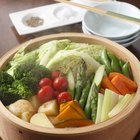
Does Food Lose Nutritional Value After ...

Slow Cookers & Nutrition

Is Eating Smoked Foods Healthy?
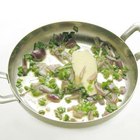
What Is the Best Cookware for Electric ...
Does Cooking Break Down Fiber?
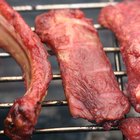
How to Smoke Food With Cedar Chips
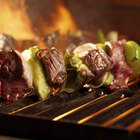
Tips on Grilling With the Char-Broil ...
What Are the Dangers of Boiling Food in ...

Does Boiling Fruits Destroy Vitamins?

Advantages & Disadvantages of Dry ...
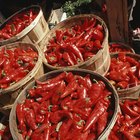
Health Benefits of Hot Peppers
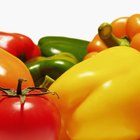
Nutrition Facts About Raw or Cooked ...

How to Use Wood Chips in a Smoker
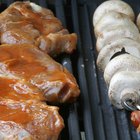
How to Use a Smoker Box for Gas Grilling
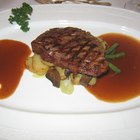
About Cooking Stones

Why Does Food Cook Faster in a Pressure ...

Are the Nutrients Lost in Slow Cooking?

Fruits & Vegetables: Carbon Dioxide ...
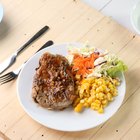
How to Cook Steak to Get the Most Out ...
References
Resources
Writer Bio
Chris Dinesen Rogers has been online marketing for more than eight years. She has grown her own art business through SEO and social media and is a consultant specializing in SEO and website development. Her past work experience includes teaching pre-nursing students beginning biology, human anatomy and physiology. Rogers's more than 10 years in conservation makes her equally at home in the outdoors.
Photo Credits
Jack Puccio/iStock/Getty Images